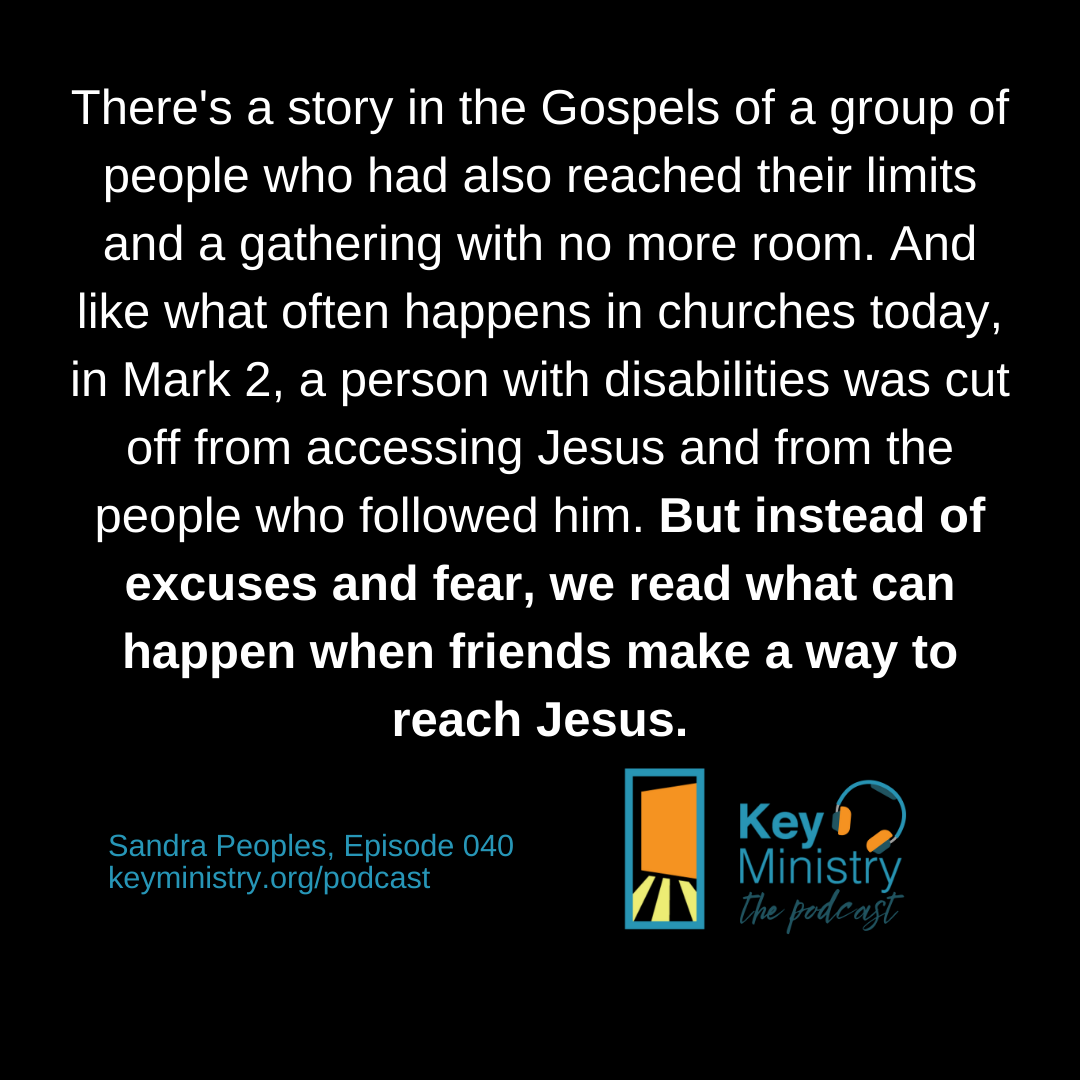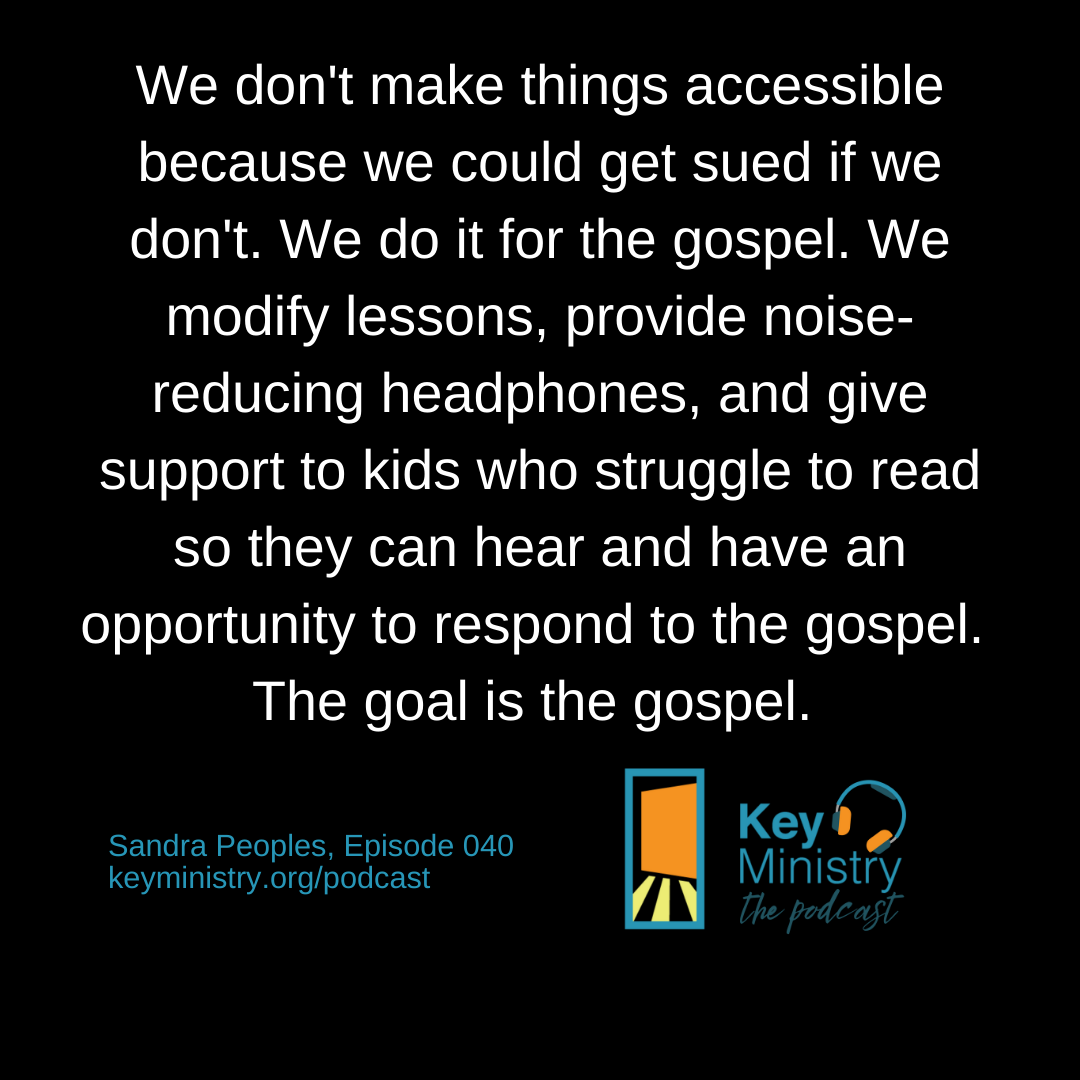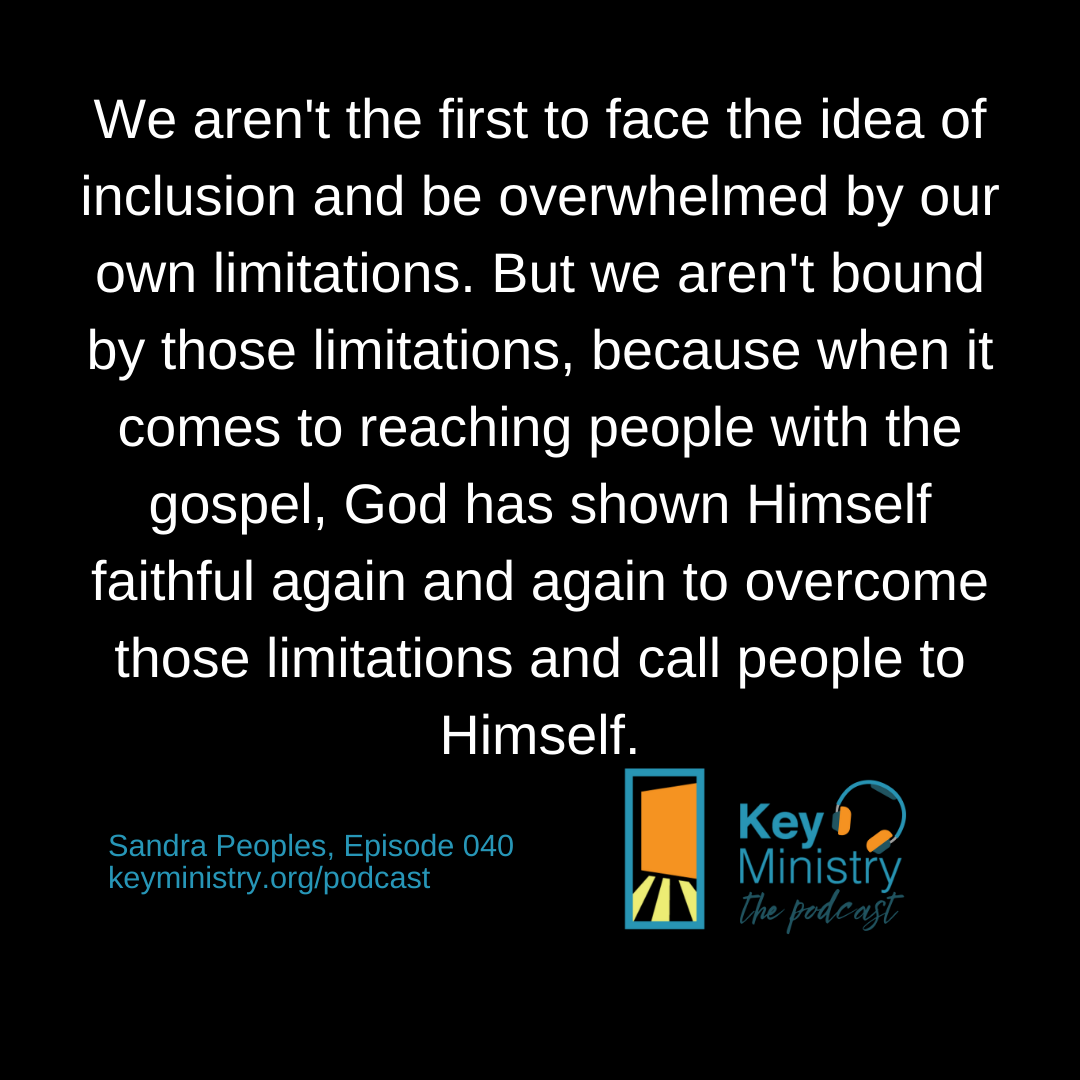Today’s episode is a message of encouragement for those of you in children’s ministry who want to be more proactive about including kids with disabilities, including mental health and behavioral diagnosis. In your school district, it's likely that 20% of the students are receiving IEP or 504 accommodations to make learning easier for them. The message we share, the gospel, is important enough to be willing to make some accommodations in our ministries as well! So let's talk about why and how you can make your ministry more accessible!
Listen now in your favorite podcast app!
Quick Links:
Every Child Welcome by Katie Wetherbee
Including People with Disabilities in Faith Communities by Dr. Erik Carter
Disability and the Church Conference
Free Disability or Mental Health Ministry Consult
Transcript:
Hi friends, this is episode 40 of Key Ministry the podcast, and I'm your host today, Sandra Peoples! In this episode, I have a special message of encouragement for those of you in children’s ministry who want to be more proactive about including kids with disabilities, including mental health and behavioral diagnosis. In your school district, it's likely that 20% of the students are receiving IEP or 504 accommodations to make learning easier for them. The message we share, the gospel, is important enough to be willing to make some accommodations for too in our ministries! So let's talk about why and how you can make your ministry more accessible!
Let me tell you a story that happened last year at a ministry conference for children's and family ministry leaders. I was introduced to a children's minister and her husband. I shared that I'm the disability ministry consultant for our state convention and that I'd be speaking on inclusion. "Oh," the husband said, "that's great. My wife is way too busy to think about adding kids with special needs to our church. Plus, once one of them comes, they all come. And we don't have the volunteers or space for that." He said it all with a smile, clearly expecting me to understand their priorities. I nodded and mumbled "Nice to meet you," as I walked away, unable to put together words that would make sense and communicate what I thought of these excuses. I had plenty of mental responses a few minutes later:
My family is not worth your wife's time?
Your church isn't willing to reach lost special-needs families with the gospel?
You think we are a burden to your church and your resources?
Would you say that about any other group of people? "We don't want to reach a family with a teenager because then they will all come." Or, "We don't have enough volunteers for the preschool classes, so we won't let those families come until their kids are in first grade."
I couldn't get his words off my mind in the days that followed. As encouraged as I was by the children's, family, and next-gen leaders and volunteers who sat in my sessions on training buddies and supporting special-needs families, I could still hear his excuses on a loop: no time, no volunteers, no space. I prayed about my strong reaction to his words, telling God how deeply hurtful they were both personally and on behalf of so many families like mine who can't attend church. A prayed a phrase from a verse in Job that I turn to often: "Teach me what I do not see" (34:32). It reminds me that there's always more to a situation than I can see and to run my thoughts of frustration and confusion through the filter of Philippians 4:8. God, show me what is true in this situation that I cannot see.
When I thought through the list again—no time, no volunteers, no space—I didn't hear disdain or apathy. I heard fear. I realized this was a husband trying to support his wife in her ministry calling by protecting her limited time and energy. He saw how she dreaded Saturday night texts from those once-a-month helpers who couldn't make it (again). He listened as she told him how the ministry budget was tight but that the playground needed a new layer of mulch before summer. He knew the church's recent baby boom was a blessing, but a growing ministry needs space, and the nursery and preschool rooms were already full. So when he met me, he didn't hear an opportunity to reach families with the gospel. He heard yet another strain on limited resources. He feared people with disabilities and their families would want more than his church and his wife were able to give.
There's a story in the Gospels of a group of people who had also reached their limits and a gathering with no more room. And like what often happens in churches today, in Mark 2, a person with disabilities was cut off from accessing Jesus and from the people who followed him. But instead of excuses and fear, we read what can happen when friends make a way to reach Jesus.
And when he returned to Capernaum after some days, it was reported that he was at home. 2 And many were gathered together, so that there was no more room, not even at the door. And he was preaching the word to them. 3 And they came, bringing to him a paralytic carried by four men.
These men wanted to bring their friend to Jesus. They had likely heard of his reputation as a healer. And hearing that Jesus was in a home, they saw an opportunity to get their friend close to him. At this time, people with disabilities were blocked from having access to the temple. By being cut off from the temple, people with disabilities were also cut off from the community built around the rhythms related to worship, sacrifices, and feasts. No temple and no community. This paralytic man was in a desperate situation—a situation made worse by his inability to save himself. But his friends had hope. They just had to find a way in. Verse 4 says, "And when they could not get near him because of the crowd, they removed the roof above him, and when they had made an opening, they let down the bed on which the paralytic lay" (v. 4).
They had the same challenges we are faced with: no time (Jesus may only be passing through and there for a short time), no volunteers (It's up to just the four friends), and no space (They couldn't even open the door). But instead of these being hindrances they couldn't overcome, they used them as motivation. I can almost hear their optimism: "There's no time like the present! We can do it together! We can't get through the door, but we can make a way through the roof!" They overcame the challenges and found a way to get their friend to the healer they had heard about, but Jesus's reaction may have surprised them. From verse 5: "And when Jesus saw their faith, he said to the paralytic, 'Son, your sins are forgiven'” (v. 5). These men thought they were coming for their friend's healing. What they found was the gospel—the good news that Jesus can forgive sins and create a new life in all of us.
This is the good news of the gospel message, and this gospel message is why we do inclusion. We don't do it so a visitor doesn't rant in our town's Facebook group about how "I took my son with autism to that church, and they kicked us out of the service!"
We don't make things accessible because we could get sued if we don't. We do it for the gospel. We modify lessons, provide noise-reducing headphones, and give support to kids who struggle to read so they can hear and have an opportunity to respond to the gospel. The goal is the gospel.
We started with the why. Let's talk quickly now about how. How do we support families and include kids with disabilities? How do we decrease our fear and find confidence in an area we don't have any experience in?
The good news is, there are lots of resources to help! You aren't the first person in children's ministry to ask these questions. There are so many solutions and support systems, you don't ever have to feel alone as you take these steps.
First, let's start with the books. Oh, wait, first let me start by saying there are links in the shownotes for everything I'm going to mention. Go to Keyministry.org/podcast and click on episode 40. You'll find all the links you need. Ok, back to the books. Every Child Welcome by Katie Wetherbee and Jolene Philo is a ministry handbook written especially for children's ministry leaders who need help including children with disabilities into their existing ministries. It's incredibly practical and helpful. If you want something a little broader and more research-based, I recommend Including People with Disabilities in Faith Communities by Dr. Erik Carter. It shares a view of inclusion for every stage and expands the help for different ministry settings.
The second resource is websites like Key Ministry. You can visit our website and type something in the search bar, and literally years' worth of resources will pop up. Autism? Anxiety? ADHD? Supporting siblings? Sensory overload? Trouble with transitions? It's all there. In addition to the website resources, Key offers free consultations. You can email beth@keyministry.org, and she will help you evaluate your current ministry and make a plan for even more accessibility. I'll tell you a secret—I've been helping churches for years, and Beth is who I email when I have a question too. She's the best, and will be glad to help you and connect you to the resources you need.
And of course, I want to recommend Key's upcoming conference, Disability, and the Church. We'd love to see you in Cleveland April 28-29. If you can't make it there, we share all the main stage speakers' sessions on our Facebook page. In addition to the keynote sessions, you all get to hear the quick take presentations, which are like Ted talks—quick messages on a specific topic from an expert. And those quick takes stay on the Facebook page, so you have access to them anytime! The link to our Facebook page is in the shownotes, so make sure we've connected there.
Let's wrap up our time together with this: Experiencing what Jesus did in my life causes me to want to make that relationship possible for every single family, especially families like mine who heard a diagnosis from a doctor or therapist and their lives have never been the same since.
Don't let your fears hold you back from reaching and serving them.
We aren't the first to face the idea of inclusion and be overwhelmed by our own limitations. But we aren't bound by those limitations, because when it comes to reaching people with the gospel, God has shown Himself faithful again and again to overcome those limitations and call people to Himself. I'm praying for you and know that God will be at work in your life and in your church to draw more people to Himself.
Thanks for listening today! If this episode was helpful to you, we'd love for you to leave a 5-star rating and a review so others know it would be a good fit for them as well! And hit subscribe so you hear next week from our operations director, Beth! Have a great week!







